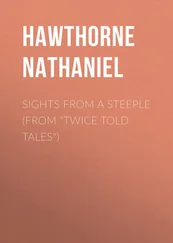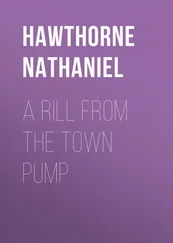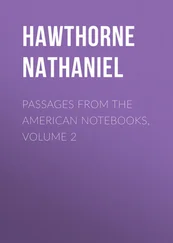Nathaniel Hawthorne - Passages from the English Notebooks, Volume 2
Здесь есть возможность читать онлайн «Nathaniel Hawthorne - Passages from the English Notebooks, Volume 2» — ознакомительный отрывок электронной книги совершенно бесплатно, а после прочтения отрывка купить полную версию. В некоторых случаях можно слушать аудио, скачать через торрент в формате fb2 и присутствует краткое содержание. Жанр: literature_19, foreign_antique, foreign_prose, на английском языке. Описание произведения, (предисловие) а так же отзывы посетителей доступны на портале библиотеки ЛибКат.
- Название:Passages from the English Notebooks, Volume 2
- Автор:
- Жанр:
- Год:неизвестен
- ISBN:нет данных
- Рейтинг книги:5 / 5. Голосов: 1
-
Избранное:Добавить в избранное
- Отзывы:
-
Ваша оценка:
- 100
- 1
- 2
- 3
- 4
- 5
Passages from the English Notebooks, Volume 2: краткое содержание, описание и аннотация
Предлагаем к чтению аннотацию, описание, краткое содержание или предисловие (зависит от того, что написал сам автор книги «Passages from the English Notebooks, Volume 2»). Если вы не нашли необходимую информацию о книге — напишите в комментариях, мы постараемся отыскать её.
Passages from the English Notebooks, Volume 2 — читать онлайн ознакомительный отрывок
Ниже представлен текст книги, разбитый по страницам. Система сохранения места последней прочитанной страницы, позволяет с удобством читать онлайн бесплатно книгу «Passages from the English Notebooks, Volume 2», без необходимости каждый раз заново искать на чём Вы остановились. Поставьте закладку, и сможете в любой момент перейти на страницу, на которой закончили чтение.
Интервал:
Закладка:
In a colonnade, on the first floor, surrounding the great basement hall, there are portraits of distinguished reformers, and black niches for others yet to come. Joseph Hume, I believe, is destined to fill one of these blanks; but I remarked that the larger part of the portraits, already hung up, are of men of high rank, – the Duke of Sussex, for instance; Lord Durham, Lord Grey; and, indeed, I remember no commoner. In one room, I saw on the wall the fac-simile, so common in the United States, of our Declaration of Independence.
Descending again to the basement hall, an elderly gentleman came in, and was warmly welcomed by Dr. – . He was a very short man, but with breadth enough, and a back excessively bent, – bowed almost to deformity; very gray hair, and a face and expression of remarkable briskness and intelligence. His profile came out pretty boldly, and his eyes had the prominence that indicates, I believe, volubility of speech, nor did he fail to talk from the instant of his appearance; and in the tone of his voice, and in his glance, and in the whole man, there was something racy, – a flavor of the humorist. His step was that of an aged man, and he put his stick down very decidedly at every footfall; though as he afterwards told me that he was only fifty-two, he need not yet have been infirm. But perhaps he has had the gout; his feet, however, are by no means swollen, but unusually small. Dr. – introduced him as Mr. Douglas Jerrold, and we went into the coffee-room to dine.
The coffee-room occupies one whole side of the edifice, and is provided with a great many tables, calculated for three or four persons to dine at; and we sat down at one of these, and Dr. – ordered some mulligatawny soup, and a bottle of white French wine. The waiters in the coffee-room are very numerous, and most of them dressed in the livery of the Club, comprising plush breeches and white-silk stockings; for these English Reformers do not seem to include Republican simplicity of manners in their system. Neither, perhaps, is it anywise essential.
After the soup, we had turbot, and by and by a bottle of Chateau Margaux, very delectable; and then some lambs' feet, delicately done, and some cutlets of I know not what peculiar type; and finally a ptarmigan, which is of the same race of birds as the grouse, but feeds high up towards the summits of the Scotch mountains. Then some cheese, and a bottle of Chambertin. It was a very pleasant dinner, and my companions were both very agreeable men; both taking a shrewd, satirical, yet not ill-natured, view of life and people, and as for Mr. Douglas Jerrold, he often reminded me of E – C – , in the richer veins of the latter, both by his face and expression, and by a tincture of something at once wise and humorously absurd in what he said. But I think he has a kinder, more genial, wholesomer nature than E – , and under a very thin crust of outward acerbity I grew sensible of a very warm heart, and even of much simplicity of character in this man, born in London, and accustomed always to London life.
I wish I had any faculty whatever of remembering what people say; but, though I appreciate anything good at the moment, it never stays in my memory; nor do I think, in fact, that anything definite, rounded, pointed, separable, and transferable from the general lump of conversation was said by anybody. I recollect that they laughed at Mr. – , and at his shedding a tear into a Scottish river, on occasion of some literary festival… They spoke approvingly of Bulwer, as valuing his literary position, and holding himself one of the brotherhood of authors; and not so approvingly of Charles Dickens, who, born a plebeian, aspires to aristocratic society. But I said that it was easy to condescend, and that Bulwer knew he could not put off his rank, and that he would have all the advantages of it in spite of his authorship. We talked about the position of men of letters in England, and they said that the aristocracy hated and despised and feared them; and I asked why it was that literary men, having really so much power in their hands, were content to live unrecognized in the State.
Douglas Jerrold talked of Thackeray and his success in America, and said that he himself purposed going and had been invited thither to lecture. I asked him whether it was pleasant to a writer of plays to see them performed; and he said it was intolerable, the presentation of the author's idea being so imperfect; and Dr. – observed that it was excruciating to hear one of his own songs sung. Jerrold spoke of the Duke of Devonshire with great warmth, as a true, honest, simple, most kind-hearted man, from whom he himself had received great courtesies and kindnesses (not, as I understood, in the way of patronage or essential favors); and I (Heaven forgive me!) queried within myself whether this English reforming author would have been quite so sensible of the Duke's excellence if his Grace had not been a duke. But indeed, a nobleman, who is at the same time a true and whole-hearted man, feeling his brotherhood with men, does really deserve some credit for it.
In the course of the evening, Jerrold spoke with high appreciation of Emerson; and of Longfellow, whose Hiawatha he considered a wonderful performance; and of Lowell, whose Fable for Critics he especially admired. I mentioned Thoreau, and proposed to send his works to Dr. – , who, being connected with the Illustrated News, and otherwise a writer, might be inclined to draw attention to then. Douglas Jerrold asked why he should not have them too. I hesitated a little, but as he pressed me, and would have an answer, I said that I did not feel quite so sure of his kindly judgment on Thoreau's books; and it so chanced that I used the word "acrid" for lack of a better, in endeavoring to express my idea of Jerrold's way of looking at men and books. It was not quite what I meant; but, in fact, he often is acrid, and has written pages and volumes of acridity, though, no doubt, with an honest purpose, and from a manly disgust at the cant and humbug of the world. Jerrold said no more, and I went on talking with Dr. – ; but, in a minute or two, I became aware that something had gone wrong, and, looking at Douglas Jerrold, there was an expression of pain and emotion on his face. By this time a second bottle of Burgundy had been opened (Clos Vougeot, the best the Club could produce, and far richer than the Chambertin), and that warm and potent wine may have had something to do with the depth and vivacity of Mr. Jerrold's feelings. But he was indeed greatly hurt by that little word "acrid." "He knew," he said, "that the world considered him a sour, bitter, ill-natured man; but that such a man as I should have the sane opinion was almost more than he could bear." As he spoke, he threw out his arms, sank back in his seat, and I was really a little apprehensive of his actual dissolution into tears. Hereupon I spoke, as was good need, and though, as usual, I have forgotten everything I said, I am quite sure it was to the purpose, and went to this good fellow's heart, as it came warmly from my own. I do remember saying that I felt him to be as genial as the glass of Burgundy which I held in my hand; and I think that touched the very right spot; for he smiled, and said he was afraid the Burgundy was better than he, but yet he was comforted. Dr. – said that he likewise had a reputation for bitterness; and I assured him, if I might venture to join myself to the brotherhood of two such men, that I was considered a very ill-natured person by many people in my own country. Douglas Jerrold said he was glad of it.
We were now in sweetest harmony, and Jerrold spoke more than it would become me to repeat in praise of my own books, which he said he admired, and he found the man more admirable than his books! I hope so, certainly.
We now went to the Haymarket Theatre, where Douglas Jerrold is on the free list; and after seeing a ballet by some Spanish dancers, we separated, and betook ourselves to our several homes. I like Douglas Jerrold very much.
Читать дальшеИнтервал:
Закладка:
Похожие книги на «Passages from the English Notebooks, Volume 2»
Представляем Вашему вниманию похожие книги на «Passages from the English Notebooks, Volume 2» списком для выбора. Мы отобрали схожую по названию и смыслу литературу в надежде предоставить читателям больше вариантов отыскать новые, интересные, ещё непрочитанные произведения.
Обсуждение, отзывы о книге «Passages from the English Notebooks, Volume 2» и просто собственные мнения читателей. Оставьте ваши комментарии, напишите, что Вы думаете о произведении, его смысле или главных героях. Укажите что конкретно понравилось, а что нет, и почему Вы так считаете.












